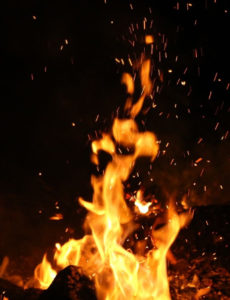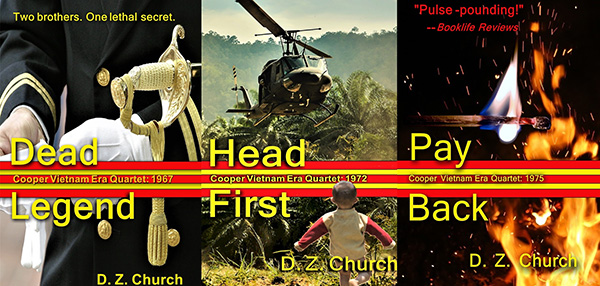Janet Dawson:
Earlier this year, D. Z. Church and I challenged ourselves to write 700-word short stories, sometimes called flash fiction. It was fun and instructive. As novelists, we are used to filling a broad canvas, with room for lots of characters, twisty plots with red herrings, and detailed descriptions of settings.
With 700 words, there is much less room to tell the story. Every word must count.
It is, unfortunately, fire season here in California, with two large and devastating blazes in the Sierra Nevada. Our story theme for September is fire.

D. Z. Church:
Almost Free
 It had been an accident; a metal blade hit stone and sparked the dry weeds. The breeze did the rest. Louisa made no attempt to put it out. She drove her tractor into the small shed at the family home and waited. It was time for it to end.
It had been an accident; a metal blade hit stone and sparked the dry weeds. The breeze did the rest. Louisa made no attempt to put it out. She drove her tractor into the small shed at the family home and waited. It was time for it to end.
When her cellphone chirped the evacuation notice, she checked out her kitchen window, the ridgeline was haloed in orange. She snapped on the charm bracelet her father had given her, grabbed her box of treasures, her computer, and her emergency suitcase, packed them in her ancient SUV, and hightailed it to a hotel. She didn’t leave the prescribed note on the door indicating the house was empty — she did pour gasoline on the kitchen floor and turn on the gas burners.
That was three days ago. Louisa tracked the raging fire religiously. She knew when updates were posted, she knew the best incident commanders, she even knew the old burns. A knock on her hotel room door drew her attention from the latest posting. The maps weren’t always accurate, but if yesterday’s was, the fire had ended her long watch.
“Miss Belden?” a voice called, followed by another knock.
Louisa peered through the drapes. Two police, one male, one female. She opened the door, wrapped in a thin bathrobe from her emergency pack. Instinctively, she clutched the lapels of the robe tight over her favorite sleep shirt.
“Do you have a moment?” The two cops stepped in. Louisa’s right hand shot up, the ice cream cone charm on her bracelet slapping her wrist. “Sorry. May we enter?”
Louisa sat at a small table in front of the hotel window. The police joined her, folding their hands on the tabletop.
“Your home has burned to the ground. While putting out embers, the fire detail found bones in the ashes of the kitchen, the fire seems to have concentrated there. We’ve been looking for you since, hoping to find you alive.”
Louisa fidgeted with her charm. “You found me. There was a root cellar under the kitchen; my sister and I played house in it when we were little.”
“Christine?”
Louisa nodded. “She disappeared when she was twelve, between the bus stop and home. Twenty years ago. I have a picture of her in my treasure box.” Louisa fluttered a hand toward her few items piled on an armchair.
“No need. This bracelet was in the ashes near the bones. Not a full skeleton, the smaller bones disintegrated in the heat. A skull and femur survived.”
Louisa fingered the horse charm dangling from the bracelet the male cop held. “Father insisted that Christine was kidnapped because the bracelet was gone.”
“According to the cold case files, you girls rode the bus to school that day, you had band practice, Christine came home alone. One of the neighbor boys claimed he saw your father and sister in the woods arguing or kissing the night before. He was four, so it was disregarded. He still insists.”
“So?”
“Your father molested your sister, didn’t he? The bracelet was meant to buy her silence.” The male cop flicked the ice cream cone dangling from Louisa’s bracelet. “I bet you were happy when he moved on to Christine. Or were you jealous?”
 The female cop crossed to Louisa’s treasure box. “Enough to kill her,” she said, holding up a filet knife.
The female cop crossed to Louisa’s treasure box. “Enough to kill her,” she said, holding up a filet knife.
“Christine’s favorite shooter marble is in there, too, if that matters. My sister showed me the knife on the way to school. It was back in the utensil drawer the next day. I searched for her for years. When I found her grave, I told father I was going to the police, he bought me a pinecone charm.
“You didn’t leave a note when you evacuated, did you hope the incident report would assume the bones were yours?”
Louisa nodded. “Then we would be free.”
“We’ve tried to locate your father. Do you know where he is?”
“Gone. Mother remarried after he left.”
“The femur was an adolescent’s; the skull is an adult’s. The fire crew is still searching.”
“May I?” Louisa held her hand out for her sister’s bracelet, adding Christine’s charm to her own.
Janet Dawson:
The Fire
 The smoke is worse this morning. The fire will soon come over the ridge.
The smoke is worse this morning. The fire will soon come over the ridge.
I hope so.
The fire will dispose of the body, obliterating all the evidence. No one the wiser. At least that’s the plan.
I certainly didn’t plan to kill him. It just happened.
I was going to leave anyway. I’d had enough. For a long time now, I wanted to break free. But I had to be careful and choose my moment.
He had changed. No, He’d always been that way. Back then I didn’t see it. What I took for concern and caring, as I reeled from my parents’ sudden deaths, turned out to be control and imprisonment. He moved me away from my hometown, out here to the mountains, where he could keep an eye on me. He wouldn’t even let me have a pet. I was reduced to talking to the chickens.
He wouldn’t let me go into town by myself. Always there, watching me, ready to strike at the slightest hint of disobedience. Following me through the grocery store. When he went to the hardware store or the gas station, he’d tell me I had to stay in the truck. If I moved, I knew what would happen when we got home. And he wouldn’t let me near the bank.
It took a long time to save the money. I had to be careful. I’d smudge the receipt for the groceries so he couldn’t check the amount spent and received in change. But I couldn’t do that all the time, or he’d notice. Twice I even took money from his wallet when he left it on the bureau. That was risky.
I hid the money with my keepsakes—Dad’s watch and my mother’s locket. I wrapped everything in plastic and cloth and put it in the wooden box my brother made. Then I buried it in the garden and put a pot of geraniums on top. I didn’t dare pack a bag. He would have known I was leaving.
The fire gave me the chance I need. It started three days ago and moved with lightening speed through the mountains, darkening the sky with smoke and ash. Yesterday a deputy from the sheriff’s office drove up the dirt road leading to our cabin.
The deputy was a woman. She got out of her truck and said, “Evacuation order coming. Soon, unless the wind shifts or they get a handle on this fire. You folks best be ready to leave.”
He gave her a look and a sneer. He didn’t hold with women being deputies, not knowing their place. “We’re not leaving. You said your piece. Get off my property.”
The deputy looked past him, at me, a question in her eyes. I lowered my gaze, so he wouldn’t see me.
The moment is now, I told myself. The fire is the perfect cover.
Later, while I was dishing up food, I said, “We should pack up a few things, just in case.”
He backhanded me. “Shut up. I don’t need you telling me what to do.”
Later, after he drank his whisky and fell asleep, I gathered a few things into a canvas bag. I didn’t sleep much that night. Early in the morning, I went out to the garden and moved the geranium. With a long-handled spade, I dug up the box.
 “What have you got?”
“What have you got?”
He was behind me. I spun around and he grabbed the box.
“Money? You bitch. You been holding out on me.”
It was like pouring gasoline on a fire. I was burning with anger, built up over years of slaps and punches, years of hiding bruises, black eyes and cut lips. I swung the spade, again and again.
I didn’t mean to kill him. Maybe I did. No matter. He’s gone, finally. And I’m free.
I poured a splash of gasoline, just to help things along. Then I stuck the box in my bag and walked down the dirt road. I flagged down a truck. It was the deputy from the day before.
“He decided to stay,” I said.
She grimaced. “It’s his funeral.”
I smiled as I got into the truck. It is indeed.
What’s up this month:
D. Z. Church:
As I read about the surrender of the Afghani troops, the rush to Kabul, and the evacuation, I can’t help but compare it to the Fall of Saigon in 1975, the subject of Pay Back, the third book in The Cooper Quartet. The parallels between the two events are too keen. The U.S. pulling out of a lost war, one fought for 18 years the other 20, money spent on arming our allies, training their pilots, and building an air force, only to see both crumble in days. In Pay Back, the Cooper family is entangled in the Fall of Saigon, each driven by the need to make recompense for their pasts. Their story begins in 1967 in Dead Legend, as the Vietnam War tears the U.S. apart; the second book, Head First, unfolds in 1972 during the Christmas bombings as the U.S. prepares to pull out our troops. The eBook of Head First will be available for 99¢ on Amazon, September 9-12.
Don’t Tell, the final book of The Cooper Quartet, deals with the aftermath and repercussions of the Fall of Saigon for the Cooper family. It will be published on November 11; the date seems apropos.

My blog is available at LadiesofMystery.com, posted on August 26. The title is The Oxen are Slow, but the Earth is Patient. It continues from the first paragraph above, discussing the impact of the Fall of Saigon on the characters in The Cooper Quartet, and ties it to the current situation in Afghanistan.
I’m readying Don’t Tell for publication and working on my new series, the Wanee Mysteries, which take place in a prairie town beginning in 1876.
Recommendations: If you haven’t already, try Heather Haven’s Alvarez Family Mysteries. And off the mystery train, I’ve been enjoying Last Tango in Halifax and The Durrells in Corfu on Netflix and Prime, in that order.
Janet Dawson:
Knees. Mine. They’ve been creaky and cranky for years and it’s time for that total knee replacement surgery. Yeah, both of them.
I was amused a few years ago when I went to a high school reunion and listened to the people at my table talk about their knee and hip replacement surgeries. I’m not laughing now. I really would like to be able to go hiking again. Or get up from a chair without moving as slowly as my father did.
The thing about surgery during a pandemic, however, is that it might get canceled. Which happened. My August surgery date was canceled less than 24 hours before I was due to report to the hospital.
It was rescheduled the following week, for a September date. Here’s hoping surgery goes ahead as planned. But as we know, the best-laid plans…
In the meantime, I’m working on The Things We Keep, the latest in the Jeri Howard series, and hope to finish it in the next couple of months. If I’m recuperating from surgery, hey, I’m not going anywhere.
 The Jeri Howard Anthology, Books 1-5, will be free September 17-20, so pick up a copy on Amazon.
The Jeri Howard Anthology, Books 1-5, will be free September 17-20, so pick up a copy on Amazon.
Recommendations: I love it when a book I pick up at random in the library turns out to be a winner. I was cruising the New Mysteries section and wound up checking out The Blood is Still by Douglas Skelton. It’s the second in a series about newspaper reporter Rebecca Connolly, set in Inverness and the highlands and islands of Scotland. Second in the series? Well, of course, I have to read a series in order. I quickly located a copy of the first, Thunder Bay. Both books are quite good and I look forward to reading more from Skelton. The third in the series is just out in the UK and it looks like Skelton has written several other series.
Streaming my British mysteries, as always. I’ve discovered Whitechapel, on Britbox, with Rupert Penry-Jones as DI Joseph Chandler, an obsessive-compulsive detective inspector, and the always wonderful Phil Davis as world-weary DS Ray Miles. The squad investigates murders that are copycat killings based on historic crimes. It’s Whitechapel in London’s East End, of course, so in the first series, a killer is replicating the brutal Jack the Ripper murders. In the second series, the copycat crimes are equally nasty murders based on a 1960s killing spree by the Kray twins, famous East End gangsters. I’m really enjoying this series and these two actors are watchable in whatever they do. Penry-Jones is great in the series Silk, about lawyers in chambers, on Amazon Prime. Davis is perfection as the moneylender Smallweed in the 2005 miniseries of Bleak House. Which is terrific, BTW, and also available on Britbox.
That’s our news for this month. Happy reading!
